 |
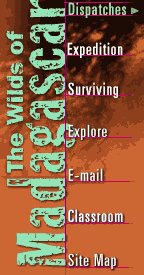 
56k | ISDN Get RealPlayer software |
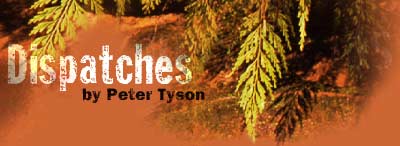 June 3, 2000 Camp Life Unveiled
The day begins around 5:30, when the first fingers of light reach into the forest canopy. Our two camp cooks, Nestor Randrianasy and Jean Zoky, already have the campfire crackling and water on the boil for coffee and tea, and soon team members begin stirring within the scatter of tents here at Camp Two. There's the sound of unzipping, and people emerge, some with daypacks already packed for the day's work, and make their way toward the beacon that is the cook tent. After that first cup, everyone nips into plastic bowls full of rice pudding with raisins and sweetened condensed milk. It's the breakfast we have every day without fail, but I don't seem to get sick of it. Rice is so important to the people of Madagascar that they say "to eat rice" when they mean "to eat a meal." Summing up his people's feeling about this staple, the great Malagasy king Andrianampoinimerina, who reigned in the 18th century, once said, "Rice and I are one."
By late morning, smoke begins to rise again above the cook tent, and the occasional smell of rice or onions cooking makes it up the hill to my tent. An hour or two later Randrianasy and Zoky have a heaping bowl of rice and beans ready for anybody who has returned from the forest (or never went there in the first place). Those who stay in the forest get biscuits and cheese and sausage and chocolate, but here it's rice and beans. You can spice it up with hot sauce, which the Malagasy pour on, but that's all there is. The only variety comes with dessert: a pair of small bananas, say, or a slice of pineapple.
Then something amazing happens. The sun dips behind the ridge at about 3:30 p.m., and the temperature plunges. Within minutes, I go from sweating in a t-shirt to looking around for my sweatshirt. The rest of the afternoon is pleasantly cool. This is the time to bathe or fill water bottles in the stream, catch up on notes or e-mail, or enjoy a cup of tea sweetened with locally raised vanilla, which Randrianasy and Zoky have at the ready for returning fieldworkers. Night falls quickly in the tropics, and by 6:00 p.m. it's all but dark. Birdsong subsides, and night insects and frogs begin filling acoustic niches all around us. The wind-like sound of the stream becomes more pronounced. Your eye is drawn upwards to the sky, which, though darkening, remains bright compared to the blackened forest. Returning team members gather at the cook tent for a debriefing. If it's raining, they squeeze in tight against one another under the overhanging cloth ceiling, politely jostling for the best position away from drips or direct rain. People sit on boxes, bamboo poles, hemp sacks - whatever is handy. After the debriefing, they stare into the coals of the cooking fire and wait for a dinner of rice and sardines, or rice and corned beef, or rice and beans. (One night, to everyone's delight, we had pasta.) A few sip out of plastic cups half-full of Three Horses, the national brew.
In the middle of the night, you might be awakened by a suddenly intensifying downpour. Or a great crash of unknown origin in the forest. Or a puddle that has formed under your foam pad from rain that, despite your best efforts, has somehow managed to penetrate your tent. But inevitably you drop off again to the stream's soothing tones, and the next time you look out your tent door, the bushes outside appear ever so slightly less dark than they did when you last looked out: dawn is imminent. You can bet Randrianasy and Zoky are in the cook tent, fanning the fire. Peter Tyson is Online Producer of NOVA. In the next day or two we hope to temporarily capture one or more silky sifaka for study and then release them back into their home range. Watch this space for news and photos of this exciting phase of the research. Dispatches Forest of Hope (June 7, 2000) A Great Day for Silkies (June 4, 2000) Camp Life Unveiled (June 3, 2000) Three Hours with the Silkies (June 1, 2000) Angels of Marojejy (May 31, 2000) Wildlife (May 30, 2000) Into the Marojejy Massif (May 28, 2000) Croc Cave (May 26, 2000) Fossa! (May 25, 2000) Bat Cave (May 24, 2000) Update: English Camp (May 23, 2000) Update: Sunken Forest (May 21, 2000) Update: Night Walk (May 20, 2000) Update: 70 Feet Up (May 19, 2000) Update: Tropical Downpour (May 18, 2000) Photos: Peter Tyson. The Expedition | Surviving The Wilds | Explore Madagascar Dispatches | Classroom Resources | E-Mail | Resources Site Map | The Wilds of Madagascar Home Editor's Picks | Previous Sites | Join Us/E-mail | TV/Web Schedule About NOVA | Teachers | Site Map | Shop | Jobs | Search | To print PBS Online | NOVA Online | WGBH © | Updated November 2000 |
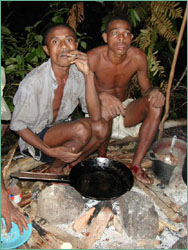 Porters Jean Yves Totohambana (without shirt) and Fidelis, who like many
Malagasy goes by only one name, await their dinner in the cook tent.
Porters Jean Yves Totohambana (without shirt) and Fidelis, who like many
Malagasy goes by only one name, await their dinner in the cook tent.
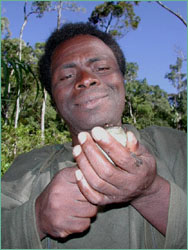 In the five days I've been confined to my tent, guide Desiré Rabary has never
tired of going out of his way to show me animals he's found along the trail,
such as this frog.
In the five days I've been confined to my tent, guide Desiré Rabary has never
tired of going out of his way to show me animals he's found along the trail,
such as this frog.
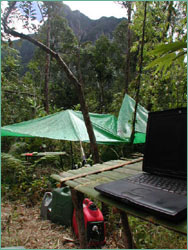 My laptop sits at the ready on the simple wooden table that our two camp
cooks fashioned out of forest materials in about 15 minutes.
My laptop sits at the ready on the simple wooden table that our two camp
cooks fashioned out of forest materials in about 15 minutes.
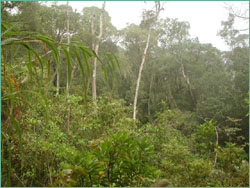 The forest around our camp is alive with sounds, especially at night.
The forest around our camp is alive with sounds, especially at night.